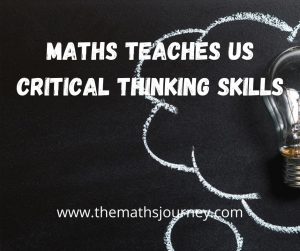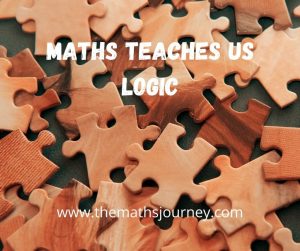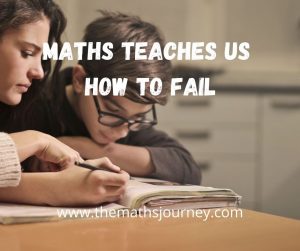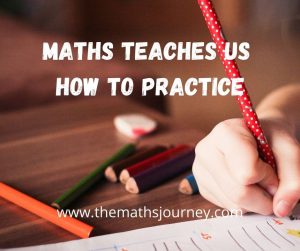Every teacher hears it, and every student asks it at least once. "Where am I going to use maths in real life?" As a teacher I often answered that question with a list of careers, that to be honest, at least half of my students would never want to do. So, today, I want to ask it in another way:
 When we learn maths, we learn a bunch of rules, right? But, in order to do well in maths, we need to know when to apply those rules. It is no good trying to factorise using a difference of squares method, when you have a trinomial. While you are on the right track, the method you are using is wrong. We need to critically look at the question, and all of its parts, and then decide what we are going to use.
This is a skill that we need in the real world. You need to be able to critically analyse a problem, look at the tools that you have, and use them to solve that problem. You need to say, "I have a screw driver or I have a hair dryer, which one would help me to hang up a picture, and which one would help me dry my hair?" Well this example is simplistic, when we reach the working world we will be faced with many similar types of questions. Being able to think critically will make us better at solving problems - and thats really everything that a job entails.
When we learn maths, we learn a bunch of rules, right? But, in order to do well in maths, we need to know when to apply those rules. It is no good trying to factorise using a difference of squares method, when you have a trinomial. While you are on the right track, the method you are using is wrong. We need to critically look at the question, and all of its parts, and then decide what we are going to use.
This is a skill that we need in the real world. You need to be able to critically analyse a problem, look at the tools that you have, and use them to solve that problem. You need to say, "I have a screw driver or I have a hair dryer, which one would help me to hang up a picture, and which one would help me dry my hair?" Well this example is simplistic, when we reach the working world we will be faced with many similar types of questions. Being able to think critically will make us better at solving problems - and thats really everything that a job entails.
 One of the great things about maths is that it teaches you to follow steps. You need to think carefully about the steps you take to get to a certain point. If you want to draw a graph, first you find all the coordinate pairs, then you find the x- and y-intercept values, and finally you plot the graph.
When you are baking a recipe, you also need to follow the steps. You can't add the flour before you have creamed the butter and sugar. When you drive a car you first have to turn the car on, then put the car into gear, and then use the accelerator to move forward. There are so many more examples of following a sequence of steps.
Being able to follow steps in a logical order is a very important skill.
One of the great things about maths is that it teaches you to follow steps. You need to think carefully about the steps you take to get to a certain point. If you want to draw a graph, first you find all the coordinate pairs, then you find the x- and y-intercept values, and finally you plot the graph.
When you are baking a recipe, you also need to follow the steps. You can't add the flour before you have creamed the butter and sugar. When you drive a car you first have to turn the car on, then put the car into gear, and then use the accelerator to move forward. There are so many more examples of following a sequence of steps.
Being able to follow steps in a logical order is a very important skill.
 Logic is a very important skill to have in the real world. Logic allows us to solve problems by following a systematic sequence of thoughts. It helps us to figure out what to do when we have a problem.
Logic is the ability to think up your own steps, to follow them through and adjust them when they are not working out the way you expected. Logic is being able to see that a square peg doesn't fit into a round hole, or to see that a suitcase won't fit into a certain space.
Logic is a very important skill to have in the real world. Logic allows us to solve problems by following a systematic sequence of thoughts. It helps us to figure out what to do when we have a problem.
Logic is the ability to think up your own steps, to follow them through and adjust them when they are not working out the way you expected. Logic is being able to see that a square peg doesn't fit into a round hole, or to see that a suitcase won't fit into a certain space.
 This may be a more South African one because we have a syllabus called Mathematical Literacy. I think this is something that should be taught across all maths syllabi.
When we learn about how graphs intersect, we are also learning about break-even analysis. We learn about simple and compound interest and paying back loans. In the core maths CAPS curriculum, we also learn about present value and future value annuities, and sinking funds.
When we start a business (particularly one that sells physical products) we need to look at certain costs. How much will our stock cost, how much we will make per item, what our other physical costs will be and what our intermittent costs will be. We need to be able to budget and work out what we owe and how much is coming in (integers).
This may be a more South African one because we have a syllabus called Mathematical Literacy. I think this is something that should be taught across all maths syllabi.
When we learn about how graphs intersect, we are also learning about break-even analysis. We learn about simple and compound interest and paying back loans. In the core maths CAPS curriculum, we also learn about present value and future value annuities, and sinking funds.
When we start a business (particularly one that sells physical products) we need to look at certain costs. How much will our stock cost, how much we will make per item, what our other physical costs will be and what our intermittent costs will be. We need to be able to budget and work out what we owe and how much is coming in (integers).
 Making mistakes in maths is inevitable. But how we deal with them will determine our success in maths (and in life).
Personal story time: When I was in first year, I studied basic physics. I won't lie - it took me rather by surprise. It was far more difficult that I expected and I failed my first term test. I was devastated. But, I realised that I needed to go right back to the beggining and figure out what I was missing. It took many weeks of studying (and some tears) before I felt more confident. My second term test was better, but I still wanted to do more. So I studied all of my work right from the begining again, did all of the tutorials (like mini assignments and worksheets) and when i got something wrong, I went back and checked where I had made my mistake. For the June exam I got 86%!
Now that is just one example of the many times that I went back and started again. (I won't mention my matric paper 2 in June - geometry made me sad). But, the moral of the story is, you can either choose to live with the mistake and choose not to grow from it, or you can go back through your work and figure out where you went wrong.
One of the best predictors of students results is how they study for maths tests, and how they handle their mistakes. Students who learn from their mistakes - those students who go and check the answers and work through their own answers to see where they went wrong - do much better in tests. This is because they know how to spot a mistake (and because they've spent time practicing - but that's for another day).
Maths teaches us how to handle our mistakes. Will we take ownership for something that we did by mistake and fix it or are we going to ignore our mistakes and walk through life blind folded?
Making mistakes in maths is inevitable. But how we deal with them will determine our success in maths (and in life).
Personal story time: When I was in first year, I studied basic physics. I won't lie - it took me rather by surprise. It was far more difficult that I expected and I failed my first term test. I was devastated. But, I realised that I needed to go right back to the beggining and figure out what I was missing. It took many weeks of studying (and some tears) before I felt more confident. My second term test was better, but I still wanted to do more. So I studied all of my work right from the begining again, did all of the tutorials (like mini assignments and worksheets) and when i got something wrong, I went back and checked where I had made my mistake. For the June exam I got 86%!
Now that is just one example of the many times that I went back and started again. (I won't mention my matric paper 2 in June - geometry made me sad). But, the moral of the story is, you can either choose to live with the mistake and choose not to grow from it, or you can go back through your work and figure out where you went wrong.
One of the best predictors of students results is how they study for maths tests, and how they handle their mistakes. Students who learn from their mistakes - those students who go and check the answers and work through their own answers to see where they went wrong - do much better in tests. This is because they know how to spot a mistake (and because they've spent time practicing - but that's for another day).
Maths teaches us how to handle our mistakes. Will we take ownership for something that we did by mistake and fix it or are we going to ignore our mistakes and walk through life blind folded?
 The best way to learn maths is to do it. What that really means, is that you need to practice, practice, practice. Maths is about practicing what you have learnt, so that you know that you know what you know.
The more you practice (anything), the better you get at it. Think about soccor, the more you practice kicking the ball at the nets (or cricket, or netball, or golf or any other sport) the better you will get at doing that one thing.
The same is true for maths. Certain topics in maths, like fractions, multiplication, factorising trinomials will benefit from lots of practice, and others slightly less practice 😉
The best way to learn maths is to do it. What that really means, is that you need to practice, practice, practice. Maths is about practicing what you have learnt, so that you know that you know what you know.
The more you practice (anything), the better you get at it. Think about soccor, the more you practice kicking the ball at the nets (or cricket, or netball, or golf or any other sport) the better you will get at doing that one thing.
The same is true for maths. Certain topics in maths, like fractions, multiplication, factorising trinomials will benefit from lots of practice, and others slightly less practice 😉
 Maths is a journey. Sometimes you are going to have a clear road and easy travelling. Sometimes the road will be bumpy and you will get a flat tire. But, you change the flat, you get past the bumps and you move on to the next part of the journey.
Don't be afraid to take the road less travelled, to practice, to fail and keep on going. Maths can be frustrating but it can also be incredibly rewarding.
One of the reasons that I started this blog is to help students and teachers with great resources, that they can rely on.
Visit our worksheets page to start your journey today.
Maths is a journey. Sometimes you are going to have a clear road and easy travelling. Sometimes the road will be bumpy and you will get a flat tire. But, you change the flat, you get past the bumps and you move on to the next part of the journey.
Don't be afraid to take the road less travelled, to practice, to fail and keep on going. Maths can be frustrating but it can also be incredibly rewarding.
One of the reasons that I started this blog is to help students and teachers with great resources, that they can rely on.
Visit our worksheets page to start your journey today.
What does maths really teach us?
Maths teaches us critical thinking.
 When we learn maths, we learn a bunch of rules, right? But, in order to do well in maths, we need to know when to apply those rules. It is no good trying to factorise using a difference of squares method, when you have a trinomial. While you are on the right track, the method you are using is wrong. We need to critically look at the question, and all of its parts, and then decide what we are going to use.
This is a skill that we need in the real world. You need to be able to critically analyse a problem, look at the tools that you have, and use them to solve that problem. You need to say, "I have a screw driver or I have a hair dryer, which one would help me to hang up a picture, and which one would help me dry my hair?" Well this example is simplistic, when we reach the working world we will be faced with many similar types of questions. Being able to think critically will make us better at solving problems - and thats really everything that a job entails.
When we learn maths, we learn a bunch of rules, right? But, in order to do well in maths, we need to know when to apply those rules. It is no good trying to factorise using a difference of squares method, when you have a trinomial. While you are on the right track, the method you are using is wrong. We need to critically look at the question, and all of its parts, and then decide what we are going to use.
This is a skill that we need in the real world. You need to be able to critically analyse a problem, look at the tools that you have, and use them to solve that problem. You need to say, "I have a screw driver or I have a hair dryer, which one would help me to hang up a picture, and which one would help me dry my hair?" Well this example is simplistic, when we reach the working world we will be faced with many similar types of questions. Being able to think critically will make us better at solving problems - and thats really everything that a job entails.
Maths teaches us to follow steps
 One of the great things about maths is that it teaches you to follow steps. You need to think carefully about the steps you take to get to a certain point. If you want to draw a graph, first you find all the coordinate pairs, then you find the x- and y-intercept values, and finally you plot the graph.
When you are baking a recipe, you also need to follow the steps. You can't add the flour before you have creamed the butter and sugar. When you drive a car you first have to turn the car on, then put the car into gear, and then use the accelerator to move forward. There are so many more examples of following a sequence of steps.
Being able to follow steps in a logical order is a very important skill.
One of the great things about maths is that it teaches you to follow steps. You need to think carefully about the steps you take to get to a certain point. If you want to draw a graph, first you find all the coordinate pairs, then you find the x- and y-intercept values, and finally you plot the graph.
When you are baking a recipe, you also need to follow the steps. You can't add the flour before you have creamed the butter and sugar. When you drive a car you first have to turn the car on, then put the car into gear, and then use the accelerator to move forward. There are so many more examples of following a sequence of steps.
Being able to follow steps in a logical order is a very important skill.
Maths teaches us logic
 Logic is a very important skill to have in the real world. Logic allows us to solve problems by following a systematic sequence of thoughts. It helps us to figure out what to do when we have a problem.
Logic is the ability to think up your own steps, to follow them through and adjust them when they are not working out the way you expected. Logic is being able to see that a square peg doesn't fit into a round hole, or to see that a suitcase won't fit into a certain space.
Logic is a very important skill to have in the real world. Logic allows us to solve problems by following a systematic sequence of thoughts. It helps us to figure out what to do when we have a problem.
Logic is the ability to think up your own steps, to follow them through and adjust them when they are not working out the way you expected. Logic is being able to see that a square peg doesn't fit into a round hole, or to see that a suitcase won't fit into a certain space.
Maths teaches us how to do business
 This may be a more South African one because we have a syllabus called Mathematical Literacy. I think this is something that should be taught across all maths syllabi.
When we learn about how graphs intersect, we are also learning about break-even analysis. We learn about simple and compound interest and paying back loans. In the core maths CAPS curriculum, we also learn about present value and future value annuities, and sinking funds.
When we start a business (particularly one that sells physical products) we need to look at certain costs. How much will our stock cost, how much we will make per item, what our other physical costs will be and what our intermittent costs will be. We need to be able to budget and work out what we owe and how much is coming in (integers).
This may be a more South African one because we have a syllabus called Mathematical Literacy. I think this is something that should be taught across all maths syllabi.
When we learn about how graphs intersect, we are also learning about break-even analysis. We learn about simple and compound interest and paying back loans. In the core maths CAPS curriculum, we also learn about present value and future value annuities, and sinking funds.
When we start a business (particularly one that sells physical products) we need to look at certain costs. How much will our stock cost, how much we will make per item, what our other physical costs will be and what our intermittent costs will be. We need to be able to budget and work out what we owe and how much is coming in (integers).
Maths teaches us how to fail
 Making mistakes in maths is inevitable. But how we deal with them will determine our success in maths (and in life).
Personal story time: When I was in first year, I studied basic physics. I won't lie - it took me rather by surprise. It was far more difficult that I expected and I failed my first term test. I was devastated. But, I realised that I needed to go right back to the beggining and figure out what I was missing. It took many weeks of studying (and some tears) before I felt more confident. My second term test was better, but I still wanted to do more. So I studied all of my work right from the begining again, did all of the tutorials (like mini assignments and worksheets) and when i got something wrong, I went back and checked where I had made my mistake. For the June exam I got 86%!
Now that is just one example of the many times that I went back and started again. (I won't mention my matric paper 2 in June - geometry made me sad). But, the moral of the story is, you can either choose to live with the mistake and choose not to grow from it, or you can go back through your work and figure out where you went wrong.
One of the best predictors of students results is how they study for maths tests, and how they handle their mistakes. Students who learn from their mistakes - those students who go and check the answers and work through their own answers to see where they went wrong - do much better in tests. This is because they know how to spot a mistake (and because they've spent time practicing - but that's for another day).
Maths teaches us how to handle our mistakes. Will we take ownership for something that we did by mistake and fix it or are we going to ignore our mistakes and walk through life blind folded?
Making mistakes in maths is inevitable. But how we deal with them will determine our success in maths (and in life).
Personal story time: When I was in first year, I studied basic physics. I won't lie - it took me rather by surprise. It was far more difficult that I expected and I failed my first term test. I was devastated. But, I realised that I needed to go right back to the beggining and figure out what I was missing. It took many weeks of studying (and some tears) before I felt more confident. My second term test was better, but I still wanted to do more. So I studied all of my work right from the begining again, did all of the tutorials (like mini assignments and worksheets) and when i got something wrong, I went back and checked where I had made my mistake. For the June exam I got 86%!
Now that is just one example of the many times that I went back and started again. (I won't mention my matric paper 2 in June - geometry made me sad). But, the moral of the story is, you can either choose to live with the mistake and choose not to grow from it, or you can go back through your work and figure out where you went wrong.
One of the best predictors of students results is how they study for maths tests, and how they handle their mistakes. Students who learn from their mistakes - those students who go and check the answers and work through their own answers to see where they went wrong - do much better in tests. This is because they know how to spot a mistake (and because they've spent time practicing - but that's for another day).
Maths teaches us how to handle our mistakes. Will we take ownership for something that we did by mistake and fix it or are we going to ignore our mistakes and walk through life blind folded?
Maths teaches us how to practice
 The best way to learn maths is to do it. What that really means, is that you need to practice, practice, practice. Maths is about practicing what you have learnt, so that you know that you know what you know.
The more you practice (anything), the better you get at it. Think about soccor, the more you practice kicking the ball at the nets (or cricket, or netball, or golf or any other sport) the better you will get at doing that one thing.
The same is true for maths. Certain topics in maths, like fractions, multiplication, factorising trinomials will benefit from lots of practice, and others slightly less practice 😉
The best way to learn maths is to do it. What that really means, is that you need to practice, practice, practice. Maths is about practicing what you have learnt, so that you know that you know what you know.
The more you practice (anything), the better you get at it. Think about soccor, the more you practice kicking the ball at the nets (or cricket, or netball, or golf or any other sport) the better you will get at doing that one thing.
The same is true for maths. Certain topics in maths, like fractions, multiplication, factorising trinomials will benefit from lots of practice, and others slightly less practice 😉
Maths is a journey
 Maths is a journey. Sometimes you are going to have a clear road and easy travelling. Sometimes the road will be bumpy and you will get a flat tire. But, you change the flat, you get past the bumps and you move on to the next part of the journey.
Don't be afraid to take the road less travelled, to practice, to fail and keep on going. Maths can be frustrating but it can also be incredibly rewarding.
One of the reasons that I started this blog is to help students and teachers with great resources, that they can rely on.
Visit our worksheets page to start your journey today.
Maths is a journey. Sometimes you are going to have a clear road and easy travelling. Sometimes the road will be bumpy and you will get a flat tire. But, you change the flat, you get past the bumps and you move on to the next part of the journey.
Don't be afraid to take the road less travelled, to practice, to fail and keep on going. Maths can be frustrating but it can also be incredibly rewarding.
One of the reasons that I started this blog is to help students and teachers with great resources, that they can rely on.
Visit our worksheets page to start your journey today.
Awesome
Awesome I am impressed
Thanks TJ 😁
Learnt much about problem solving and Maths importance
I am so glad to hear that it helped TJ 🙂